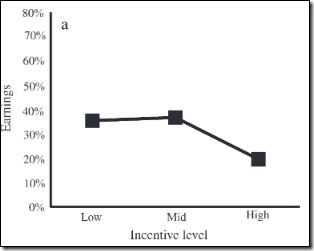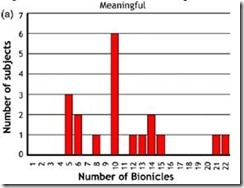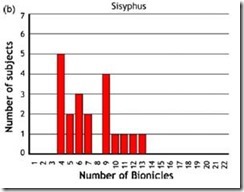What motivates you to perform well in the workplace? The irony of the possible responses to this question point to the gulf that exists between what science and experiments indicate and what business does! For example, if your answer is bonuses, cash rewards and pay raise, the research presented below can surprise you.
An experiment (Ariely, Gneezy, Loewenstein, & Mazar, 2009), on the impact of contingent –If you do this, then you get that– rewards on performance, clearly indicated that as soon as the assigned task involved even “rudimentary cognitive skills”, the performance fell as the rewards rose.
 This is a recurrent theme in multiple experiments that are captured in books such as (Ariely, Predictably Irrational) and (Pink, Drive). To put it simply, if someone you know is undergoing a critical surgery, and the surgeon is offered a large sum of money to get it right—you’d rather wish the surgeon is concentrating on the procedure and not on the new car that he’d buy using the reward. As the quoted paper puts it:
This is a recurrent theme in multiple experiments that are captured in books such as (Ariely, Predictably Irrational) and (Pink, Drive). To put it simply, if someone you know is undergoing a critical surgery, and the surgeon is offered a large sum of money to get it right—you’d rather wish the surgeon is concentrating on the procedure and not on the new car that he’d buy using the reward. As the quoted paper puts it:
Most upper-management and sales force personnel, as well as workers in many other jobs, are paid based on performance, which is widely perceived as motivating effort and enhancing productivity relative to non-contingent pay schemes. However, psychological research suggests that excessive rewards can in some cases produce supra-optimal motivation, resulting in a decline in performance. With some important exceptions, we observed that high reward levels can have detrimental effects on performance.
So what is it that motivates us and leads to a better performance? Not money, as indicated above! It is suggested that the triad of Autonomy, Mastery and Purpose (Pink) is what is key to motivating people whose work involves cognitive and reasoning capability. Let me talk about the sense of purpose and the search for meaning in this writing.
Let’s start with an anecdote:
Someone, call him Amit, was given a task by his boss, Shikhar, to create a presentation for an upcoming event. Amit gave it his all and made a lot of effort. When he showed his excellently made presentation to Shikhar, Shikhar informed him that the event has been cancelled. Amit went into a depression and was foul tempered for a large part of the next few days.
Does the above incident seem realistic? Why was Amit depressed when he got paid to do something and he did? It was probably because the purpose of his effort was cruelly snatched from him. The sense of pride and meaning was no longer there! There have been multiple experiments to quantitatively express the same thought.
In a study conducted at Harvard University, Ariely asked participants to build characters from using Lego bricks. In one condition-called the meaningful condition, participants were paid decreasing amounts for each subsequent model: $3 for the first one, $2.70 for the next one, and so on. The creations were stored under the table, to be disassembled at the end of the experiment. In the other condition- called the Sisyphus Condition, the creations were disassembled as soon as they’d been built. This was an endless cycle of them building and the experimenters destroying them in front of their eyes.
The results were surprising. The first group made 11 models, on average, while the second group made only seven before they quit.
| No of Models(Bionicles) created in Meaningful and Sisyphus Conditions | |
 |
 |
The Upshot is Even though there wasn’t huge meaning at stake, and even though the first group knew their work would be destroyed at the end of the experiment, seeing the results of their labour for even a short time was enough to dramatically improve performance.
In another part of the same experimental setup, it was found that participants who were interested in Lego Models made more models (naturally!), but only in the meaningful condition. There was no correlation between the number of models created and the Interest level in the Sisyphus condition. This clearly indicates that as soon as the sense of purpose – no matter how trivial – is snatched from the participants, even the intrinsic affinity to the task at hand does not improve performance. If the organisation has great hiring practices and selects only the best people, and pays them well; the lack of alignment to the purpose of the task at hand can severely hamper performance.
Bibliography
Ariely, D. (n.d.). Predictably Irrational.
Ariely, D., Gneezy, U., Loewenstein, G., & Mazar, N. (2009). Large Stakes and Big Mistakes. Review of Economic Studies, 451-469.Pink, D. (n.d.).
Drive, The Surprising truth about what motivates us.

Very nice read. Something to always keep in mind for yourself and people around you.
Right, this also brings the fact that motivation is a fragile thing into sharp relief.